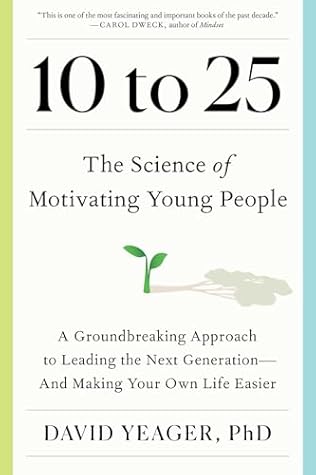More on this book
Kindle Notes & Highlights
by
David Yeager
Started reading
January 26, 2025
As a scientist, I am often skeptical of parenting experts—and really anybody peddling secret knowledge about the next generation. Sometimes, it feels like parenting is the only area of self-help that’s worse than dieting, which is notoriously driven by fads and contraditions, not science. When it comes to mentor-mindset parenting, how can we tell the difference between common sense and common nonsense?
How does Sergio Estrada react when a student misses a physics problem? He doesn’t say, You got this wrong because you forgot to multiply the force. He asks, “Can you tell me how you got this answer?” Then he starts collaboratively troubleshooting, building on the student’s understanding.
And what does Stef Okamoto say to an employee on track for a poor performance review? She doesn’t declare, You’re doing everything wrong. She asks, “Can you tell me where you’re getting stuck and what you’ve tried so far so we can try to fix the problem?” Then she runs interference.
I wonder how many of these supposedly lazy young people just needed a manager like Jen Wu. If a mentor sets aside fifteen minutes a day (or even fifteen minutes a week) to ask you authentic, open-ended questions about how to optimize your time, you’ll feel motivated. On the other hand, having a manager who doesn’t give you any meaningful time or attention is demotivating. Who knows how much money businesses could save—and how much more respected young employees would feel—if new hires got the Jen Wu treatment. They would probably work more efficiently, overperform, and want to stick around at
...more
Lorena’s tour through the history of parenting research surfaced two themes. First, just about every expert said some version of the same thing: Understand and address the underlying cause of the child’s behavior; don’t just respond to the behavior. Second, parents rarely do it. Positive parenting and addiction have a lot in common, Lorena noticed. Everybody’s constantly falling off the wagon.
By and large, child psychologists’ big theoretical insights in the twentieth century didn’t occur to them when the macaroni was burning on the stove, the repairman was knocking at the door, and four kids were fighting over an iPad. Their revelations occurred in quiet offices, surrounded by books. Parenting advice therefore tends to be impractically tailored to hypothetical parents who have endless attention and patience, no constraints on their time, and logical, compliant children. That’s not the reality most parents live in.
Sometimes, both parents feed into the problem. One parent is the enforcer, the other the protector. They’re partners in the nice-and-nasty dance.
Lorena thinks that a mindset shift is the key to escaping this dance because she sees parents trapped in the dichotomy of good parent versus bad parent—a fixed mindset of parenting. Parents think, I went to the seminar, and I read the book, and I still ended up blowing up at my kids. I guess I’m a bad parent. They fall back into the protector mindset. But the protector’s indulgence prevents kids from learning how to be self-directed—which inevitably leads to repeated behavior, another enforcer explosion, and more guilt.
The parent might then ask, “Now that I understand what you needed, what could I have done to make sure you got it?” In that moment, the child feels heard, validated, and supported. But the child also has to think.
These days, when Lorena hears bickering two rooms over, she announces, “Girls, what am I going to ask you?” After a pause, a sigh, or a grunt, they say, “You’re going to ask us if we’re fighting over what we really need… and if we could find a way to have both of us get what we need… and that in our house we’re supposed to solve our own problems respectfully… because you love us and you want us to be successful adults after we grow up and move out.” “Okay,” Lorena replies, “can you have that conversation and work it out?” “Fine!” they yell and huff off, better friends than before and more
...more
“I got tired of refereeing,” she told me. Her kids would fight, and she’d take away the toy or whatever. But her mindset was wrong. She was depriving her kids of the chance to learn skills like resilience and responsibility. “I resolved to never referee a fight again,” she said. That decision to shift toward a mentor mindset and start asking questions (mostly during do-overs) saved her hours and countless headaches. That realization inspired her to coach parents to ask, not tell when they’re in a conflict.


